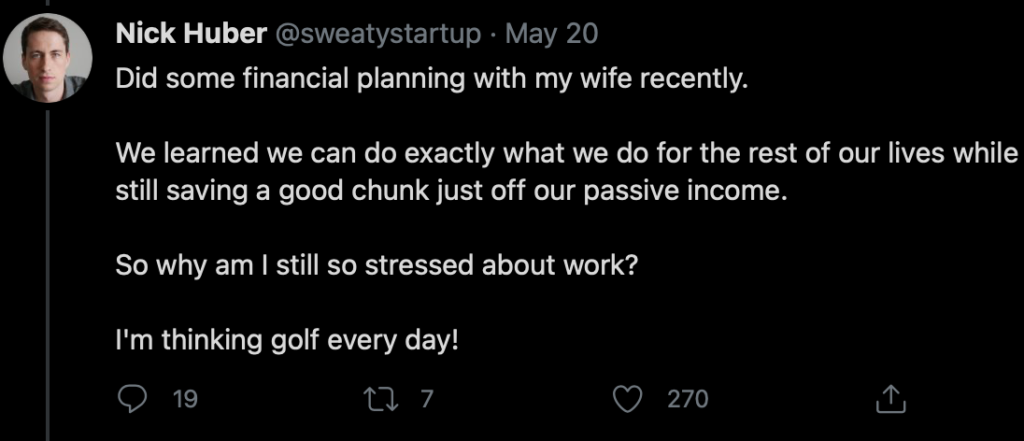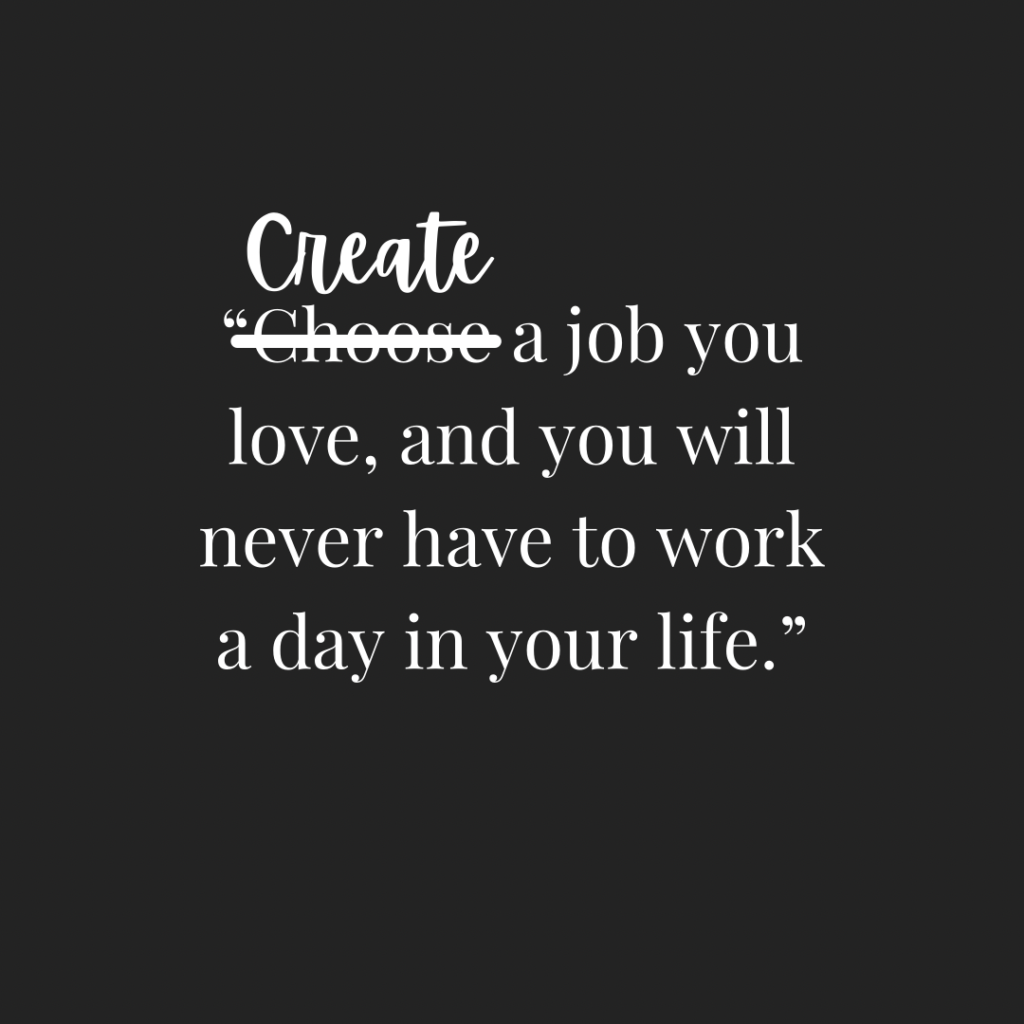Last week Nick Huber sent this Tweet and I replied, “We are made to work. We aren’t made for sitting around golfing everyday.”

“Did some financial planning with my wife recently.
We learned we can do exactly what we do for the rest of our lives while still saving a good chunk just off our passive income.
So why am I still so stressed about work?
I’m thinking golf every day!”
My tweet caused quite the stir and I received replies such as these:
- “We aren’t made to work. At least not all of us.”
- “Well said. Work isn’t just about money.”
- “LOL, we are definitely not made to work. We have the capacity for work, but it’s not our fundamental guiding principle.”
- “Work doesn’t have to mean sitting at a desk 40 hours a week. Doing nothing is not healthy.”
- “We are made to work, play and create”
- “Golfing while sitting is very difficult.”
- And many more.
For a concept as universal as work I thought there would be more universal consensus, but I was wrong.
Retiring early at the age of 29
Travel back with me to the summer of 2016, when I became the youngest person in my family to retire.
Only a couple weeks past my 29th birthday, I walked into my boss’s office and quit my job. I had no plan except that I didn’t want to work in the corporate world anymore. It was too soul sucking, there wasn’t any freedom, and I didn’t want to grow old having only taken a few weeks of vacation per year.
I couldn’t understand why anyone would want to climb the corporate ladder.
Why should you work for over 40 years with the dream of retiring someday and traveling the world, learning an instrument, climbing a mountain, visiting Antarctica, or whatever other bucket list items you have. Only to finally reach retirement age and be too sick, weak, and tired to cross these dreams off your bucket list?
After quitting my job I packed up my few belongings into the back of my Chevy Cruze and made the 900 mile journey from Michigan to the Lowcountry of South Carolina.
Retirement before age 30? What could go wrong.
Not only did I leave the career I had built over almost two decades I also thought it was smart to start over in a completely new town where I didn’t know a single person.
Before my retirement I hadn’t take off work more than one week at a time for over 15 years, so I took full advantage of the limitless time now at my disposal. For months I was in complete ecstasy. I slept in, ate lavish meals, took long walks, read books, learned music, and dreamt big.
I met with a successful local business owner to share my master plan, “I just want to be able to work a handful of hours per week, from anywhere in the world, and still be able to support myself.”
He didn’t tell me this, but he must have been thinking I was totally naive. “Good luck kid… That’s everyone’s dream. Welcome to the real world.”
For the decade I worked at Best Buy I lived well below my means and saved a pretty good amount of money. It was enough to cover my living expenses for about one year. If I couldn’t find a way to make my plan work I could always go back to retail or move back to Michigan.
After a few months of retirement, I began to get bored and felt depressed and lonely.
I prayed daily for God to help me figure out my purpose. “What do you want me to be doing with my life, Lord? I’ll do whatever you want me to do.”
But He didn’t respond. He let me continue to sleep in until 11AM, sit in parks in the afternoons, and completely neglect the numerous gifts He had bestowed upon me.
Finding myself and learning the meaning of work
I read over 100 books in two years including these books on success and finding your life’s purpose.
- Claim Your Power, by Mastin Kipp
- The Hole in Our Gospel, by Richard Stearns
- Hustle, by Neil Patel, Patrick Vlaskovitz, and Jonas Koffler
- Outliers, by Malcolm Gladwell
- Shaken, by Tim Tebow
- The $100 Startup, by Chris Guillebeau
- Take the Stairs, by Rory Vaden
- Stumbling on Happiness, by Daniel Gilbert
I searched high and low for a book that could explain to me how to figure out what I should be doing with my life and I sunk even deeper into depression.
Did I make a mistake quitting my job?
Should I go back to retail?
Do I need to get a college degree?
What if I move to Hollywood and try to be in movies or chase my childhood dream of being a country singer in Nashville?
Quicker than I expected my life’s savings began to dry up. I needed to make some money, so I began working on small projects that intrigued me. These projects were all challenging and required me to learn new skills.
Cal Newport writes in So Good They Can’t Ignore You, “There’s something liberating about the craftsman mindset: It asks you to leave behind self-centered concerns about whether your job is “just right,” and instead put your head down and plug away at getting really damn good. No one owes you a great career, it argues; you need to earn it—and the process won’t be easy.”
By accepting these opportunities that excited me I began to find myself and what I enjoyed doing for work:
- 2017: Partnered with Ben Greenfield to develop and launch the Christian Gratitude Journal.
- 2018: The nutritional supplement company Kion was growing quickly so I suggested they add their products onto Amazon and that I was the guy to do it for them.
- 2019: Managed the launch of the WSJ best-selling book Boundless.
- Late 2019: Began writing, inconsistently, on this blog.
- 2020: Expanded my Amazon business and began managing six additional brands full-time.
And now, in 2021, I’m writing a couple of books, freelance writing, hosting a podcast, posting twice per week on this blog, building an Amazon course, managing a handful of nutritional supplement brands on Amazon, and I’m working on much much more.
So much for “working” only a handful of hours per week.
How did I get so far away from my dream of working a handful of hours per week?
I didn’t and that’s exactly the point.
Ever hear the saying, “Choose a job you love, and you will never have to work a day in your life?”
Some version of this saying was written in all eight of the books I shared above. And every time I read it it frustrated me and so I shouted into the empty room, “Easy for you to say! I’m over here with no idea who I am or what I want to do with my life.”
Retirement was too difficult for me. I’ve ran marathons, hiked the The Manitou Springs Incline, and was the leader of multiple 100-person teams. I thought I was mentally strong enough to cruise through life without a purpose like Peter in Office Space, but I’m not.
I could no longer wait for the perfect opportunity to come to me. God wasn’t going to feed me my purpose while I was sitting around on vacation everyday. Eventually I decided to take small baby steps and move towards the direction I wanted to go.
Isn’t it easier to move an object in motion than one sitting completely still?
Even though I wasn’t quite sure where I wanted to go, I could at least be moving.
Now that I’m out of retirement and making progress on my second career, I realize the saying is true, but I would change one word.
“
ChooseCreate a job you love, and you will never have to work a day in your life.”

Creating a job you love
The work I’m doing today didn’t start out as a labor of love. It didn’t become liberating and fun until I got better and it wasn’t and still isn’t easy.
Every day when I sit at my laptop to write on this blog I question why you’d even be interested in reading what I have to say. I think that I have no right to share anything until I’m halfway through writing a blog post and think, “Wow… I’ve been through a lot. Maybe. Just maybe. My readers can learn from what I learned the hard way. Through a lot of sleepless nights, begging God for direction, and endless self doubt.”
One of the books that originally inspired me to quit my job was The 4-Hour Workweek, by Tim Ferriss. It took me a long time to understand the true concept behind his book and the title.
At Best Buy I worked 50-60 hours per week or more and it felt like I was giving away a piece of my soul each time I clocked in.
Now, I often work the same number of hours per week as before, but it only feels like I’m working Tim Ferriss’s fabled four hours per week.
How?
I say no to almost everything that drains me.
And only say yes to the opportunities that interest me:
- My calendar isn’t full of meetings, it is full of visits with people I’m interested in talking to.
- I read books that interest me ranging from detective novels written by Robert B. Parker and Raymond Chandler to entrepreneurial books like Skip The Line, by James Altucher and The Common Path to Uncommon Success, by John Lee Dumas.
- I still take long walks, but listen to the latest podcasts by Ben Greenfield, James Altucher, Eric Wood, John Lee Dumas, Rory Vaden, and Jon Vroman.
- And through my Amazon agency I help the folks that are making the most interesting nutritional products on the market.
I don’t choose opportunities based on how much money they are going to make me. In fact, now that I’ve set clear boundaries, I’m frequently offered chances to make more money, but they’d require me to do work that is draining and not exciting. I only choose oppourtunities that stoke my creativity and curiosity or with entrepreneurs I look up to. (I’m looking at you: Jesse Itzler, John Lee Dumas, and Robert Herjavec.)
As you create more value in the world more opportunities will come your way. The more demand there is for your work the more you can choose to say yes to what excites you.
And this is when I finally begin to understand Tim’s 4-hour per week lifestyle.
Summary
I’m still figuring this out and will update you as I continue to learn more. I’m a work in progress.
There are days I give in and say yes to opportunities I probably shouldn’t. For example, just last week I ran out of writing time to post here on my blog because I was busy working on a tight deadline for an interesting creative freelance writing project. I didn’t even say yes to this project, but somehow ended up doing anyway.
And there are still some tasks I complete weekly that are draining. I should outsource these tasks, but I just haven’t done it yet, such as:
- Improving the speed of my website and performing plugin updates
- Scheduling posts on my social media accounts
- Copying my posts from word and editing and formatting them on my website
- Formatting and scheduling my email newsletter
- Regular bookkeeping tasks such as invoicing and categorizing my expenses
However, most of the time I’m in amazement and grateful that by taking one small step and then another, I ended up creating work I truly love. Work that gives me a ton of energy, allows me to share stories to help a growing tribe of entrepreneurs like you, and leaves me energized at the end of each day in anticipation to start tomorrow’s workday. It doesn’t feel like work anymore. It is fun, challenging, and exciting.
We are made to work, but create a job you love to never have to “work” a day in your life.
Feature image courtesy of Aaron Burden.

4 replies on “After Retiring At Age 29, I Discovered We’re Made To Work”
I loved reading this i have created so many me’s and my husband too! I always really disliked someone telling me what to do and how to do it 8 or so hours a day and getting no where in the process! After alot of entrepreneurial adventures ( would take a while to tell about them all) we have finally found something we really love to do! Not real profitable but we love it! I still work a lot of hours and enjoy my outings seeing people I hope I’m helping to make healthier choices…. later
Hi Rita, I had no idea you and your husband were so entrepreneurial. I’d like to hear more about our adventures and how ours overlap. Talk soon!
James
Fantastic post! I ‘retired’ after 30 years in public education and have been wrestling with this topic. Thank you for sharing your journey, James.
Great to hear this has helped you. I’m curious where you’ve landed on this journey?